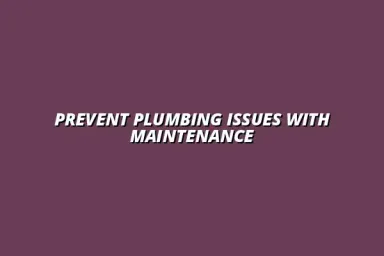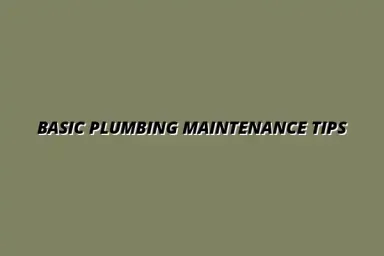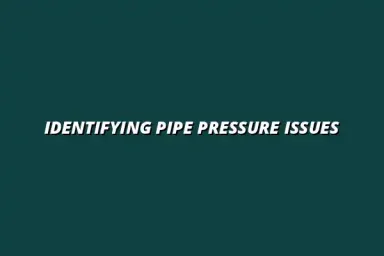Understanding the Importance of Water Heater Maintenance
Water heaters are essential appliances in our homes, providing us with hot water for daily needs like bathing, cleaning, and cooking. However, many people overlook the importance of maintaining these systems, which can lead to costly repairs or replacements. By understanding the significance of regular maintenance, you can not only extend the life of your water heater but also ensure it operates efficiently. Regular maintenance is key to preventing major issues and keeping your plumbing system in top shape, as highlighted in this guide to extending your home's plumbing life.
Taking the time for maintenance can save you from unexpected breakdowns and associated frustrations. With a little bit of effort, you can keep your water heater in top shape and enjoy its benefits for years. Isn’t it nice to know that a few simple steps can lead to a smoother and more reliable hot water experience?
Why Regular Maintenance Extends the Life of Your Water Heater
Much like your car or any other important home appliance, your water heater needs regular attention to operate at its best. When you perform routine maintenance, you're helping to prevent problems before they arise. This proactive approach can significantly increase the lifespan of your water heater. For instance, learning how to extend your electric water heater life can save you significant costs in the long run.
Some of the key benefits of regular maintenance include:
- Prevention of Major Repairs: Catching issues early can save you from expensive repairs later.
- Improved Efficiency: A well-maintained water heater runs more efficiently, consuming less energy.
- Reduced Risk of Breakdowns: Regular checks help identify potential failures before they happen.
The Cost Benefits of Maintaining Your Water Heater
Maintaining your water heater is not just about keeping the hot water flowing; it can also save you money in the long run. By performing regular maintenance, you can avoid costly emergency repairs and replacements. This can lead to significant savings over time! This is especially true when considering the importance of essential plumbing maintenance for homes.
Here are some cost benefits to consider:
- Lower Energy Bills: Efficient water heaters use less energy, which means lower utility costs.
- Extended Lifespan: A well-maintained water heater can last longer, reducing the need for premature replacements.
- Increased Home Value: A functioning water heater adds value to your home, which is beneficial if you decide to sell.
Essential Steps for Effective Water Heater Maintenance
Effective water heater maintenance involves a few essential steps that can help keep your system running smoothly. Regular inspections, timely flushing, and adjusting temperature settings are just some of the key practices. By incorporating these steps into your routine, you can ensure your water heater performs efficiently. Remember that proactive pipe maintenance, such as regular water pipe cleaning, is crucial for overall home plumbing health.
Let’s explore some of the fundamental actions you can take for effective maintenance!
Conducting Routine Inspections to Identify Issues Early
One of the best ways to maintain your water heater is by conducting routine inspections. These inspections can help you spot potential problems before they become serious. By regularly checking your water heater, you can ensure it stays in good working order. Don't forget to check other key areas of your plumbing system, including your bathroom, as outlined in this guide to essential bathroom plumbing checks.
Here are some key components to inspect regularly:
- Check for leaks around the tank and pipes.
- Inspect the temperature and pressure relief valve for proper function.
- Look for corrosion on the tank and connections.
Signs Your Water Heater Needs Attention
Knowing the signs that indicate your water heater needs attention is crucial. Early detection can save you from more extensive damage and costly repairs. Here are some common signs to look out for:
- No hot water or inconsistent temperatures.
- Unusual noises like popping or rumbling.
- Discolored water or a metallic taste.
Flushing Your Water Heater for Optimal Performance
Flushing your water heater is an important maintenance step that can help remove sediment buildup. This buildup can affect efficiency and overall performance. By routinely flushing your water heater, you can keep it running smoothly and extend its lifespan. Proper maintenance can also help prevent issues like frozen pipes during winter.
Let’s look at some benefits of flushing your water heater:
- Enhances energy efficiency by preventing sediment buildup.
- Improves the quality of hot water.
- Reduces the risk of corrosion inside the tank.
Step-by-Step Guide to Flushing Your Water Heater
Flushing your water heater is a straightforward process. Here’s a simple step-by-step guide to help you flush your unit effectively:
- Turn off the power supply or gas to the heater.
- Connect a garden hose to the drain valve.
- Open the drain valve and let the water flow out until it runs clear.
- Close the drain valve and remove the hose, then turn the power back on.
Adjusting Temperature Settings to Maximize Efficiency
Another essential step in maintaining your water heater is adjusting the temperature settings. The temperature can greatly affect both efficiency and safety. By finding the ideal temperature, you can keep your water heater running effectively.
The ideal temperature for your water heater is typically around 120°F. This setting provides enough hot water while reducing the risk of scalding. Adjusting the temperature can also help save energy by preventing overheating.
How Temperature Affects Water Heater Lifespan
Keeping your water heater at the right temperature can have a significant impact on its lifespan. A higher temperature can cause the unit to work harder, leading to increased wear and tear. On the other hand, a proper temperature setting ensures efficiency and longevity.
Maintaining an optimal temperature can lead to:
- Lower energy costs.
- Reduced risk of damage to components.
- Increased safety for you and your family.
Checking and Replacing Anode Rods as Preventive Care
Anode rods play a crucial role in protecting your water heater from corrosion. They help prevent rust from forming inside the tank, which can extend the life of your heater. Regularly checking and replacing anode rods is an important part of preventive care.
Understanding the role of anode rods can help you recognize their importance. These rods attract corrosive elements in the water, sacrificing themselves to protect the tank. If you neglect to replace them, the tank can corrode, leading to leaks and costly repairs. For comprehensive plumbing services in Billesley, Birmingham, consider contacting a local professional like a plumber in Billesley, Birmingham.
How Frequently Should Anode Rods Be Replaced?
Typically, anode rods should be checked at least once a year and replaced every **3 to 5 years**. However, the frequency can vary depending on water quality and usage. It's a good idea to inspect them more often if you have hard water!
By replacing anode rods regularly, you can:
- Prolong the lifespan of your water heater.
- Reduce the risk of leaks.
- Maintain hot water quality.
Insulating Your Water Heater for Enhanced Energy Efficiency
Insulating your water heater can be a simple yet effective way to improve energy efficiency. Proper insulation helps minimize heat loss, allowing your heater to work less to maintain hot water. This translates to lower energy bills and a more efficient appliance.
Here are some benefits of insulation for your water heater:
- Improved energy efficiency, leading to reduced costs.
- Less heat loss during standby mode.
- Increased comfort in your home with consistent hot water.
How to Properly Insulate Your Water Heater
Insulating your water heater is a straightforward process. You can use an insulating blanket specifically designed for water heaters or apply foam insulation to pipes. Here’s how to do it:
- Turn off the power supply to the heater.
- Wrap the insulating blanket around the tank, securing it with tape.
- Insulate the first few feet of hot and cold water pipes.
Scheduling Professional Inspections and Service
While DIY maintenance is important, scheduling professional inspections and service can provide added peace of mind. Trained technicians can spot issues that you might miss, ensuring your water heater remains in top condition. This proactive care can help prevent unexpected breakdowns!
It's a good idea to have a professional inspect your water heater at least once a year. They can perform in-depth checks and provide necessary repairs or recommendations for maintenance.
When to Call a Professional for Water Heater Maintenance
Knowing when to call a professional can save you time and money. Here are some situations where it’s wise to seek expert help:
- If you notice persistent leaks or unusual noises.
- When the water temperature is inconsistent.
- If you see rust or corrosion on the tank or connections.
Choosing the Right Service Provider for Your Needs
When selecting a service provider, it’s essential to choose someone you can trust. Look for companies that have good reviews, proper licensing, and experience with water heaters. Taking the time to find the right service provider can make all the difference in keeping your water heater in excellent shape.
By following these maintenance tips and seeking professional help when needed, you can ensure your water heater runs efficiently for years to come. Isn’t it comforting to know that with a little effort, you can enjoy hot water without any hassle?
Addressing Common Concerns About Water Heater Maintenance
When it comes to maintaining our water heaters, there are often questions that pop up. Understanding these frequently asked questions can help alleviate concerns and keep your water heater running smoothly. Let's dive into some of the most common queries regarding water heater care!
Many homeowners wonder about the signs of a failing water heater. Recognizing these indicators early can save you from bigger problems down the line. Additionally, knowing how often you should service your water heater is crucial for optimal performance.
Frequently Asked Questions About Water Heater Care
It’s natural to have concerns about your water heater’s performance. Here are some of the most common questions I hear:
- What are the signs of a failing water heater? Look out for leaks, strange noises, and inconsistent water temperature.
- How often should I service my water heater? Regular maintenance is recommended at least once a year.
- Can I perform maintenance myself? Yes, but some tasks may require a professional touch.
These questions are just the tip of the iceberg. Addressing them not only enhances your understanding but also empowers you to take proactive steps in caring for your water heater!
What Are the Signs of a Failing Water Heater?
Identifying a failing water heater can save you from costly repairs or replacements. Be on the lookout for these common signs:
- Inconsistent Water Temperature: If you notice fluctuating temperatures, it's a red flag.
- Unusual Noises: Banging or popping sounds may indicate sediment buildup.
- Water Leaks: Any leaks around the unit should be addressed immediately.
- Rusty or Cloudy Water: This could signify corrosion in your water heater.
Paying attention to these signs can help you take action before a small issue becomes a major problem!
How Often Should I Service My Water Heater?
Regular servicing is key to extending the life of your water heater. Here's a basic timeline:
- Annual Maintenance: Schedule a professional check-up once a year.
- Flushing: This should be done every 6-12 months to remove sediment buildup.
- Anode Rod Replacement: Check every 1-3 years, depending on usage.
By following this schedule, you can ensure that your water heater remains in optimal condition!
Final Thoughts on Prolonging the Life of Your Water Heater
Taking care of your water heater is essential to its longevity and performance. By sticking to regular maintenance practices, you can avoid costly repairs and extend the life of this important appliance. It’s all about being proactive!
Don’t wait for your water heater to show signs of trouble. Regular inspections, cleaning, and timely repairs will keep your unit running smoothly for years to come. A little care goes a long way in ensuring consistent hot water for your home!
Summarizing Key Maintenance Practices for Longevity
To wrap it all up, here are some key maintenance practices you should incorporate into your routine:
- Conduct annual inspections.
- Flush your water heater regularly.
- Adjust temperature settings carefully.
- Replace anode rods when necessary.
- Insulate the heater for energy efficiency.
By keeping these practices in mind, you can effectively prolong the life of your water heater!
Encouraging Proactive Care for Your Home’s Water Heater
Being proactive about your water heater’s maintenance not only saves you money but also provides peace of mind. Think of it as an investment in your home’s comfort and efficiency.
So, don't hesitate! Schedule your maintenance checks and stay informed about your water heater’s needs. The more attentive you are, the less likely you’ll face unexpected issues!

 Kiran Almasi
Kiran Almasi

